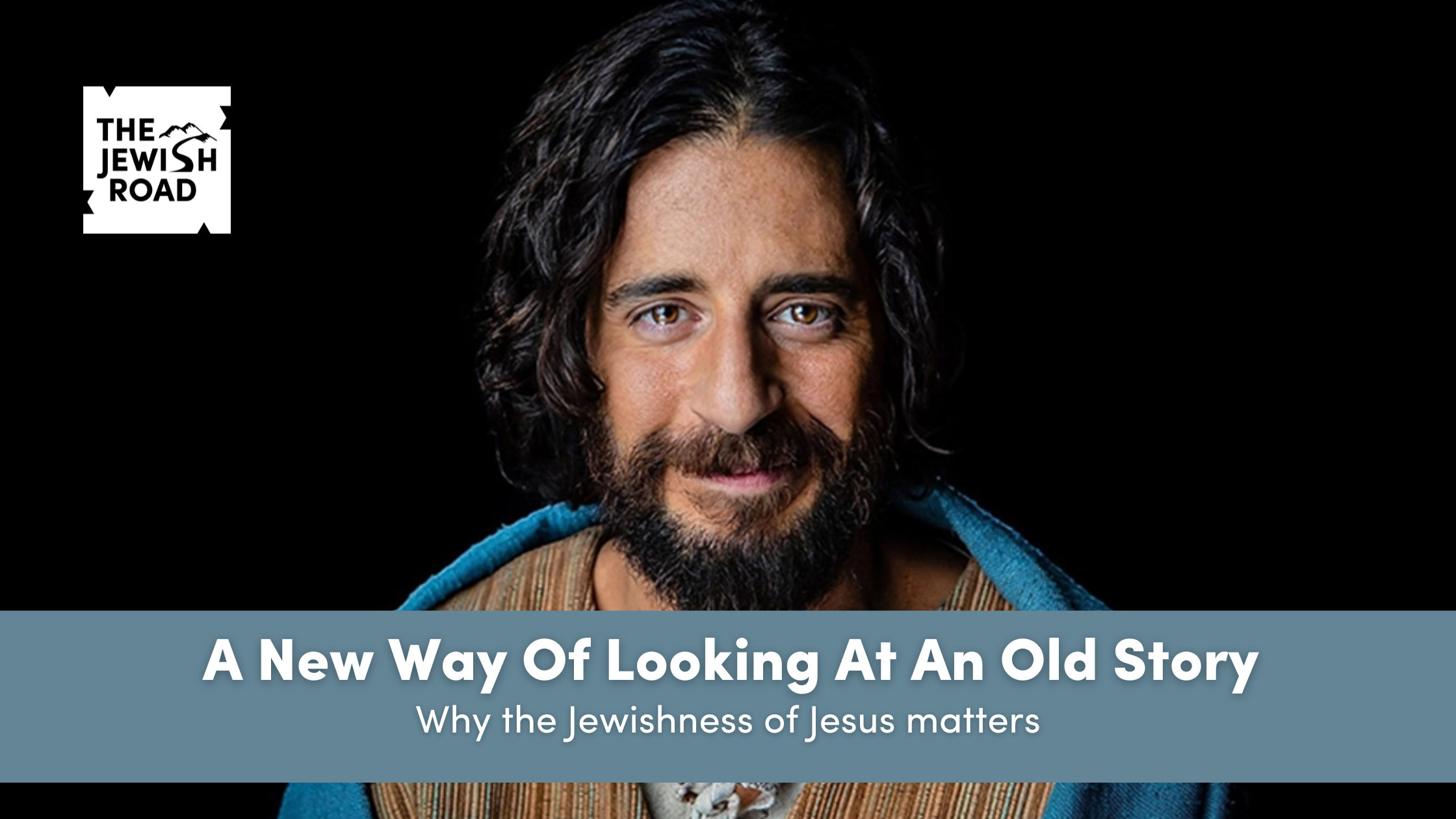A New Way Of Looking At An Old Story: Why the Jewishness of Jesus Matters
Reconnecting With The Jewish Jesus
My first real exposure to the gospel was by way of prophecy. I believe one of the things I had going for me was that I was not really tainted by any religious traditions, whether they be Jewish or Christian (which I didn’t know a lot about, just that “Jesus was not for me”).
You might say that I grew up somewhat irreligious compared to my grandparents’ orthodox Judaism, which was how my parents grew up.
I was born in Brooklyn, NY. We migrated to sunny Southern California when I was still a young kid in elementary school. A lot of Jews made that trek out west. So, we had a built-in Jewish community, but not a distinctly Jewish neighborhood like New York.
We went to synagogue sometimes. I went to Hebrew school as a young boy and became a Bar Mitzvah at 13. Nevertheless, my identity as a Jew grew to be more and more ethnic than religious. God was not really part of the equation.
A First Look At Jesus From The Old Testament
And so, when I was presented with a credible witness regarding the claims of the Messiahship of Jesus (Yeshua) that I had to seriously consider, I was able to look at the Bible as if I had never read it before (which I hadn’t). As a result, I was not overwhelmed by a lot of religious doctrine and tradition. In considering these claims of the Messiahship of Jesus, from the prophetic Word of the Old Testament, I was really seeking to understand and discern God’s heart and His message to us.
I was struck by the sense that this prophetic message was one that came from someone outside of our time domain. Wow! If this is all true, what does it mean? I’m Jewish. Do I have to join a church? A religion that’s totally foreign to me? That set me on a journey to understand the Jewish Jesus. And that Jewish Road leaped off the pages of both the Old and New Testaments. Matthew 1:1 - “The record of the genealogy of Jesus the Messiah, the son of David, the son of Abraham.” If that’s not a Jew, I don’t know who is.
I enjoyed spiritual fellowship with like-minded Gentiles for the first time. Hey, they believed in my Messiah, and I found myself teaching about the Jewish Jesus with remarkable acceptance from the Christian community. It was a whole new world. I never knew how Jewish Jesus was, and neither did the majority of Christians who believed in Jesus.
An Exodus From Organized Religion
But something has happened in America over the past, let’s say 40 years. Fewer young Americans are part of any organized religion today than at any time in the history of America.
For the most part, the children and especially the grandchildren of my generation have abandoned Christianity. And the same is true for the Jewish people, they've abandoned Judaism. To the extent the churches are shrinking in attendance, the same is happening in the synagogue. And it’s not just a matter of people being too busy to attend services. It’s deeper than that. There is an exodus from organized religion taking place, and I believe there are good reasons for it.
Why The Jewish Exodus From The Synagogues?
I think people are sincerely looking for meaning and purpose in their lives, but they don't find it in religion. They find that the messages being preached today have been so watered down with feel-good philosophy that they no longer contain the power to change lives. There is a disconnect.
From the Jewish perspective, there has been a cultural departure. We have been brought to a place of affluence, apathy, and assimilation that has numbed our senses to the things of God.
The Jewish people have always been a people of the Book. But we've gotten away from that. We don't study the Bible like we used to. We don't even read it like we used to. And when we do read it, we often interpret it through the lens of our own cultural biases.
In the time leading up to and beginning of the 20th century, most Jews were orthodox, as I mentioned about my own family. Today about 15% of Jews are orthodox. Most of the remaining Jewish people hold secular values, just like the secular left, and very few of their children attend synagogue. For me, this return to the Jewish Jesus came through my introduction to the Messianic Jewish movement. It was here that I was able to begin piecing together the puzzle of my own spiritual journey. I discovered that there were people who loved Jesus and who also loved being Jewish.
Why The Christian Exodus From The Churches?
This exodus from religion is not distinctly a Jewish problem in our culture today. The Christian church is going through the same thing. Young people are leaving the church in droves. A recent Pew Research study showed that nearly 30% of American adults under 30 years old are now unaffiliated with any religion. That’s a dramatic increase from just a few years ago.
Christians have inherited this revised picture of Jesus, a non-Jewish Jesus. It's all that has ever been presented, from the flannel graphs to the Christian cartoons, and so we don't really question it.
We need to uncover the original and true representation because if we want to know, present, and represent Jesus properly, it’s vital that our picture of Him is accurate. It is not a matter of adding a layer of Jewish culture but of uncovering a truer picture of Jesus. And that accuracy comes with an understanding of the Jewish Jesus, who He was set in that culture and that time. The Jewishness of the gospel needs to be restored.
Understanding Our Ethnic Identities
One of the things we Jews were able to do is hold on to our ethnic identity. And I held on to that. Sadly, Jesus was not a part of that ethnic identity. I knew He was Jewish, but the extent of my understanding was that this Jewish boy started a new religion called Christianity with completely different values and traditions. After a while, there was no visible sense of Jesus the Jew. He didn’t look Jewish at all.
And so my mother’s words rang in my ears, “He’s not for you.”
As far as the ethnic identity we Jews were able to hold on to, that’s not an option for those who have left Christianity because there is no Christian ethnic identity. Christianity is not both an ethnic identity and a religion. Unlike Christians who left the religion, we Jews could be nonreligious and still be Jewish. And that was my life until I was 26 years old.
Joseph, A Picture Of The Messiah
I believe, in these last days, God wants to do something else with the church and the Jewish people. We want to help Christians better understand the Jewishness of Jesus and their Jewish roots of the faith so they can help Jews make better sense of Jesus. That means we have to put Him back in His Jewish garb.
For a long time, I didn’t recognize Jesus as a Jew because He didn’t look Jewish anymore. Many years ago, when I was studying the life of Joseph in the book of Genesis, I realized that God gave us a great illustration of this when we look at the life of Joseph. Here are just a few:
We find that he was a shepherd of his father’s sheep (Gen. 37:2; John 10:11, 27-29).
He was the favored son of his father (Gen. 37:3; Matt. 3:17).
He was betrayed by his brothers, who hated him (Gen. 37:4; John 7:4-5).
He was sent by his father to his brothers (Gen. 37:13-14; Hebrews 2:11).
Taken to Egypt (Gen. 37:26; Matt. 2:14-15).
When in Egypt, Joseph was given a new name and Egyptian clothes. He looked different. In fact, when his brothers came to Egypt for food during the famine, Joseph picked them out of the crowd and recognized them (some 20 years later), but they did not recognize him. He didn’t look like Joseph anymore. And yet, Joseph became their savior, as well as Egypt and other nations.
Jesus also became the savior of a multitude of people from nations who were not originally His own people, Israel. Over the centuries, Jesus was also dressed in clothes that represented the cultures that adopted Him as Lord. You probably see where I’m going. That Jesus was unrecognizable to me as a Jew. Yet, under all of that foreign garb, He showed Himself to me as Yeshua HaMashiach, Jesus the Jewish Messiah.
As David Hoffbrand said so very well in his exciting and insightful book:
“We’ve inherited this revised picture of Jesus, so we don’t really question it. We need to uncover the original and true representation because if we want to know, present, and represent Jesus properly, it’s vital that our picture of Him is accurate…it is not a matter of adding a layer of Jewish culture but of uncovering a truer picture of Jesus.” (David Hoffbrand, The Jewish Jesus (Destiny Image Publishers, Shippensburg, PA. 2017) p.29)
Restoring The Jewishness Of The Gospel
That being said, I believe that we need to restore the Jewishness of Jesus and the gospel. We need to resist contextualizing the gospel for the Jewish people. Paul already contextualized the gospel for the Gentiles. We don’t really need to recontextualize it for the Jews. We simply need to restore it, or as Hoffbrand said, “uncover the truer picture of Jesus.”
Maybe then Jewish mothers won’t tell their children, “He’s not for you.”





